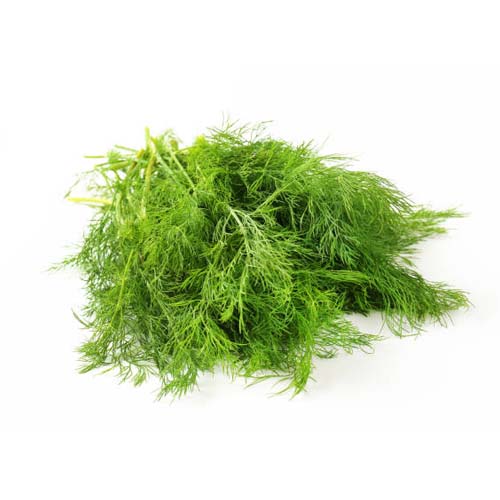
Dill Leaves, also known as Dill weed is a green leafy vegetable that has incredible therapeutic benefits and culinary applications. Coming from the celery (Apiaceae) family, this annual herb goes by the botanical name Anethum graveolens. Although it is mostly native to the Mediterranean region and Southern Russia, it is extensively cultivated and used throughout the world.
Known as Suva Bhaji in Hindi, Sathakuppai in Tamil and Sowa in Bengali, fresh dill sprigs have a strong flavour and an appealing dark sea-green colour. The herb usually grows to a height of 8-30 inches characterizing feathery, fern-like leaves with bright yellow flowers. Owing to its mild citrusy flavour, dill leaves or the seeds of dill can often be employed as a condiment spice, used as a dressing for salads, flavouring agent to add taste to soups and curries and even be consumed as a juice.
Apart from culinary applications, dill leaves imbued with powerful digestive, anti-microbial, anti-flatulent, and cardiotonic properties, have also been used since decades as a traditional ayurvedic remedy for treating a host of health and skin conditions.
1. Many chemical components obtained from plants that are known to have antioxidant, disease-preventing, and health-promoting qualities may be found in dill weed.
2. This well-known plant has extremely few calories and no cholesterol. It does, however, contain a lot of antioxidants, vitamins including niacin and pyridoxine, as well as dietary fibres that aid in regulating blood cholesterol levels.

3. Numerous essential volatile oils, including d-carvone, dillapiole, DHC, eugenol, limonene, terpinene, and myristicin, are found in dill seeds and leaves (sprigs).
4. Dill's essential oil, Eugenol, has been used medicinally as an antibacterial and local anaesthetic. Additionally, eugenol has been shown to lower blood sugar levels in diabetics.
5. Dill oil, which is made from dill seeds, has calming, antispasmodic, digestive, carminative, and disinfecting qualities. It also aids in the flow of breast milk.
6. Additionally, it is abundant in several key vitamins, including as folic acid, riboflavin, niacin, vitamin A, ß-carotene, and vitamin C, all of which are necessary for a healthy metabolism in the human body.
7. Natural flavonoid antioxidants like vitamin A and -carotene are substances.
8. 7718 IU, or 257% of the daily required amount of this vitamin, are present in 100 g of dill weed sprigs. In addition to supporting healthy mucosa and skin, vitamin A is necessary for clear eyesight. Flavonoid-rich natural foods aid in the body's defence against lung and oral cavity malignancies.
9. Vitamin C, an effective antioxidant, is found in fresh dill. About 85 mg, or 140%, of vitamin C are present in 100 g. Vitamin C scavenges dangerous, pro-inflammatory free radicals and aids in the body's development of tolerance to pathogenic pathogens.
10. Minerals including copper, potassium, calcium, manganese, iron, and magnesium are abundant in dill weed. Many essential enzymes, such as cytochrome c-oxidase and superoxide dismutase, require copper as a cofactor (other minerals function as cofactors for this enzyme are manganese and zinc). Numerous enzymes that control digestion, growth and development, and nucleic acid synthesis use zinc as a co-factor. Potassium is a crucial element of bodily fluids and cells that helps regulate heart rate and blood pressure. Manganese serves as a co-factor for the antioxidant enzyme superoxide dismutase in the human body.
All Copyright © 2024 Saturn Worldwide Impex